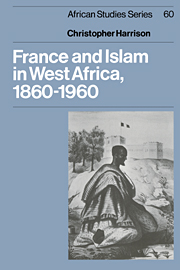Book contents
- Frontmatter
- Contents
- Acknowledgements
- Abbreviations
- Map
- 1 Introduction
- PART I 1850–1898: NINETEENTH-CENTURY ORIGINS OF FRENCH ISLAMIC POLICY
- PART II 1898–1912: THE FEAR OF ISLAM
- PART III FRENCH SCHOLARSHIP AND THE DEFINITION OF ISLAM NOIR
- PART IV 1920–1940: THE FRENCH STAKE IN ISLAM NOIR
- Introduction
- 8 Post-war attitudes to Islam
- 9 The French stake in Islam
- 10 The ‘rediscovery’ of Islam
- 11 Epilogue 1940–1960
- 12 Conclusion
- Notes
- Bibliography
- Index
8 - Post-war attitudes to Islam
Published online by Cambridge University Press: 01 February 2010
- Frontmatter
- Contents
- Acknowledgements
- Abbreviations
- Map
- 1 Introduction
- PART I 1850–1898: NINETEENTH-CENTURY ORIGINS OF FRENCH ISLAMIC POLICY
- PART II 1898–1912: THE FEAR OF ISLAM
- PART III FRENCH SCHOLARSHIP AND THE DEFINITION OF ISLAM NOIR
- PART IV 1920–1940: THE FRENCH STAKE IN ISLAM NOIR
- Introduction
- 8 Post-war attitudes to Islam
- 9 The French stake in Islam
- 10 The ‘rediscovery’ of Islam
- 11 Epilogue 1940–1960
- 12 Conclusion
- Notes
- Bibliography
- Index
Summary
As far as French attitudes towards Islam were concerned there was one major thread of continuity with the pre-war situation: Paul Marty remained in Dakar until 1921. At one stage it seemed as though he was to be posted to Lebanon, but this project was abandoned at the last minute. On learning of this change of plan Marty wrote: ‘I am delighted and am packing my cases with joy to return to my dear Moors and Blacks in A.O.F’. One of the people with whom Marty had become acquainted in the course of his research into West African Islam was the colourful figure of Sheikh Ibra Fall. In October 1921, Sheikh Ibra Fall came to Dakar to profess both his and his master Serigne Ahmadu Bamba's continued loyalty to the mère patrie and to show their respect to the new Governor-General, Merlin. He had been meaning to do this for a long time, but he explained that:
My visit has always been delayed on account of the fact that that noble phalange of good old Africans who brought us up in the love of France and who guided us in our dealings with our white and enlightened chiefs have now almost all disappeared and have made way for unscrupulous politicians in whom we can have no confidence.
- Type
- Chapter
- Information
- France and Islam in West Africa, 1860–1960 , pp. 144 - 163Publisher: Cambridge University PressPrint publication year: 1988

